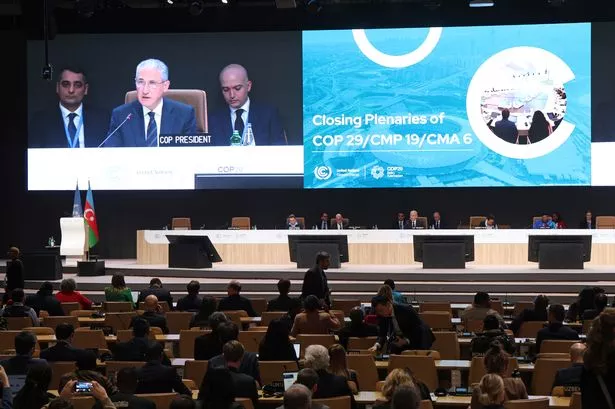Your cart is currently empty!
Cop29 draft finance deal rejected as negotiators walk out of UN climate talks

# COP29 Draft Finance Deal Rejected as Negotiators Walk Out of UN Climate Talks
In a dramatic turn of events at COP29, the latest draft deal on climate finance has been met with staunch rejection from developing economies. This rejection came a day after the UN summit was meant to conclude, with negotiators from both wealthy and poor nations engaged in intense discussions in Azerbaijan to reach an agreement on financial support for developing countries.
A significant development occurred when a group of negotiators from the Least Developed Countries (LDC) bloc and the Alliance of Small Island States decided to walk out of the talks in protest against the rough draft presented in Baku. Evans Njewa, chairman of the LDC group, expressed dissatisfaction, stating that the current deal was unacceptable and required further consultation with other developing nations.
The rejected rough draft proposed an annual financial commitment of $250 billion by 2035, a substantial increase from the previous goal set 15 years ago. However, this amount fell short of the experts’ estimation of over $1 trillion annually required to address climate-related challenges effectively. Subsequent discussions indicated a proposed increase to $300 billion in the latest draft.
Developing nations have accused wealthier countries of employing tactics to assert dominance and provide inadequate financial assistance through prolonged negotiations. Small island nations, highly vulnerable to the impacts of climate change, voiced frustration at being overlooked during the two-week summit, further exacerbating tensions between different negotiating parties.
As the negotiations entered a critical phase with ministers and delegates needing to depart for home, concerns mounted over the urgency to secure a viable financial deal. Mohamed Adow of Power Shift Africa highlighted the risk posed by potential compromises that may not align with the necessary actions to combat climate change effectively.
The contrasting financial demands of developing countries, seeking $1.3 trillion for adaptation and mitigation efforts, against the proposed figures underscored the significant divide in expectations. Amidst the uncertainty, stakeholders emphasised the imperative for wealthier nations to demonstrate greater commitment to providing substantial financial resources to assist vulnerable countries.
While optimism persisted amongst some delegates, including an acknowledgment of the challenging circumstances, concerns lingered over the possible failure to bridge the financial gap at the summit. The imperative to uphold prior commitments to reduce fossil fuel usage and adhere to climate goals remained a contentious issue, reflecting the intricate dynamics at play in the negotiation process.
In light of the evolving developments at COP29, the global community awaits further deliberations and potential breakthroughs to address the pressing climate finance challenges at hand.
**Insights and Summary:**
The rejection of the draft finance deal at COP29 underscores the complex negotiations surrounding climate finance and the disparities in financial commitments between developed and developing nations. The walkout by key negotiating blocs reflects the lingering disparities in expectations and the urgency to address climate-related challenges effectively. As the discussions continue, there is a pressing need for collective action and enhanced commitment from all parties to bridge the financial divide and accelerate progress towards climate resilience and sustainability.
